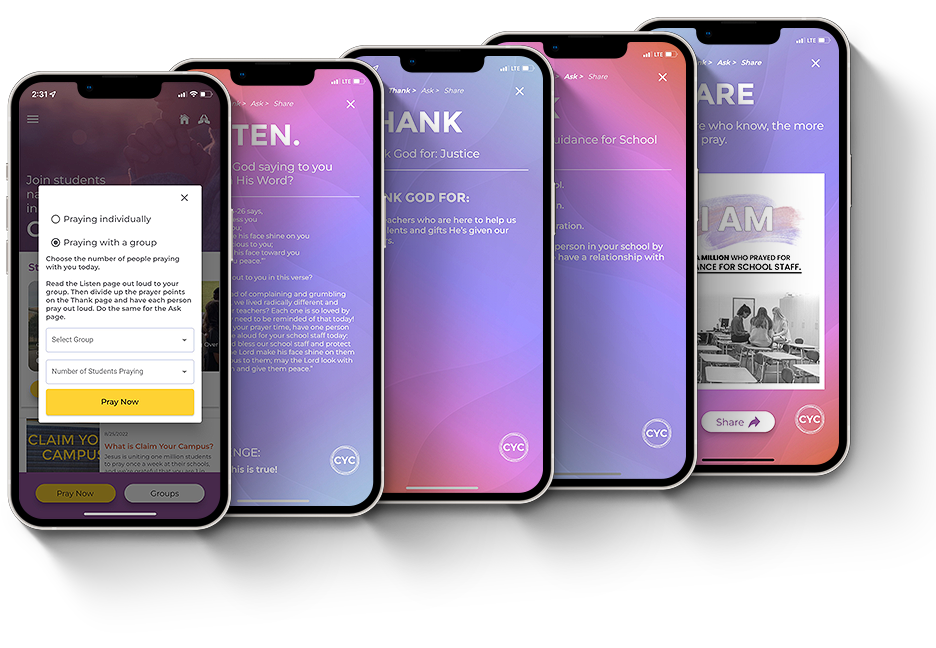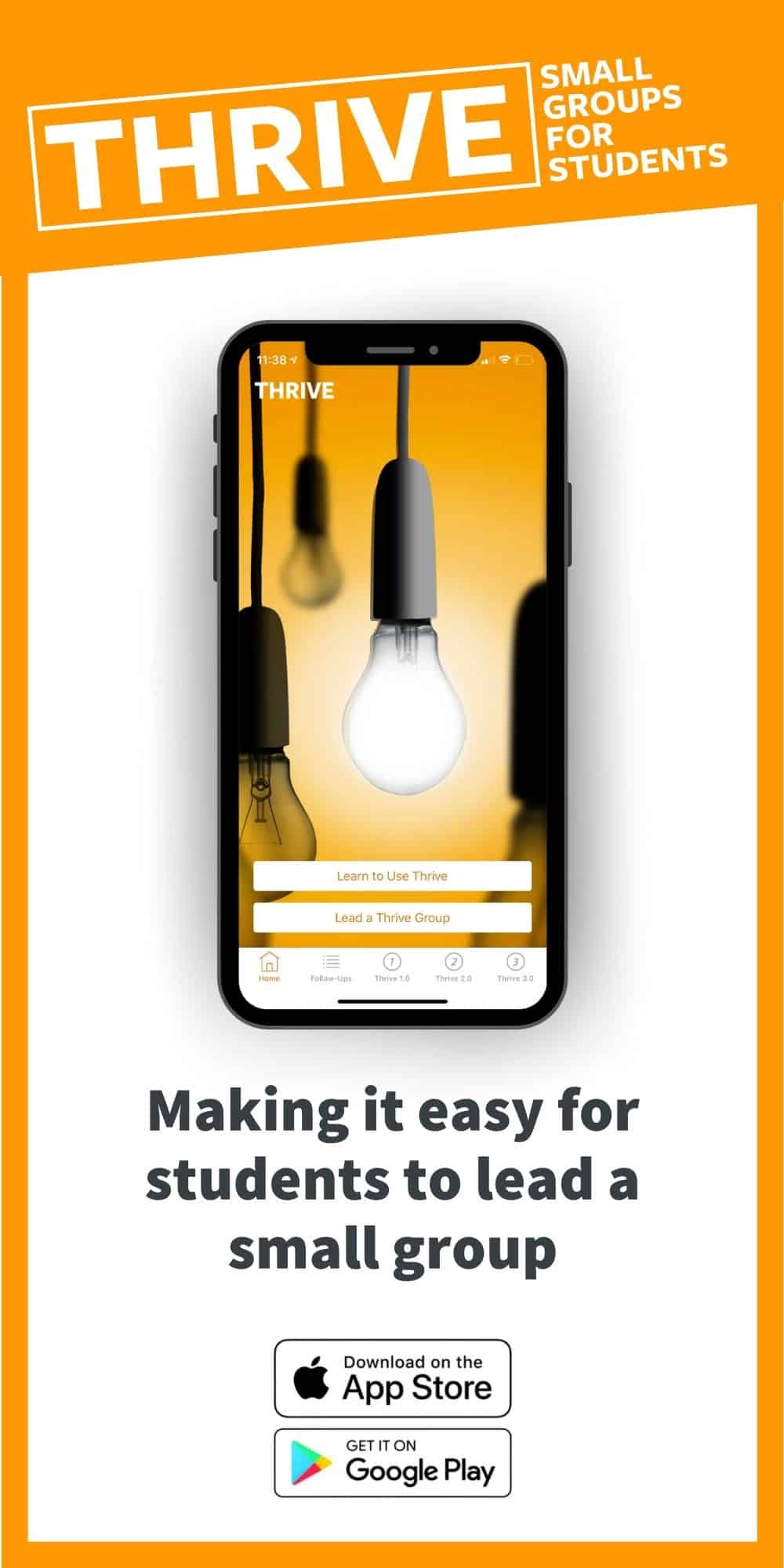How are you going to share the gospel with your entire campus?
The same way you eat an entire elephant– one bite (or in this case one group) at a time!
Every campus is made up of many smaller groups. By identifying and focusing on specific groups of students, you are able to progressively expand your relationships, and the gospel spreads further and wider.
One of the best ways to reach a particular group, team, or club on campus is with a focused group outreach. This is an event where you gather students from that specific group or team for games, food, and an opportunity to learn more about a relationship with God.
As most of us don’t have a background in large-scale event planning, this might sound intimidating. But don’t worry, we’ve come up with some resources to help you.
Here are eight questions to consider as you plan your next outreach.
Most middle and high schools have numerous clubs, sports teams, and interest groups. Some of these might be larger groups like the marching band, cheerleading squad, and sports teams. There are also usually smaller clubs like honor societies and service groups. You may even be thinking about trying to reach the whole school.
As you picture your campus, think about who you know. In which clubs or teams are your student leaders involved? Are there any coaches, teacher sponsors, or administrators who are Christians? Consider which groups have influence or reach the largest number of students.
Give thought to these factors, pray about it, and then select a group to focus on.
If you want to reach the football team, you probably don’t want to host an outreach for the entire campus that you hope the team happens to attend. To reach a specific club or team, the best approach is to host an event just for those students before or after their practice or meeting.
Cru uses three different types of outreach strategies: classroom talks, creative outreaches, and team talks. Each of these strategies is effective, but it’s important to consider who you are trying to reach and choose the plan that best fits them.
The location of an outreach can significantly impact its success.
If you want to host an event for the entire school, the best place is definitely not in a small classroom on the edge of campus. If it takes place on campus, you’d want to use a central courtyard, practice field, or parking lot– a place that is visible and easy to access. If the event is off campus, consider a student’s home or a neutral public building that would fit a lot of people.
Think about what spaces are available, and where students would feel comfortable.
You want to have the outreach at a time when the most students from that group can attend and when there will be the fewest distractions. With sports teams this is often just before or after practice. Some clubs might have dead time between the end of school and when the club starts. Sometimes providing dinner right after practice or club time is a great window of opportunity- and let’s face it, everybody likes food!
Talk with the coach or teacher sponsor of the club and the students who participate in those groups to determine the best time.
By identifying and focusing on specific groups of students, you are able to progressively expand your relationships, and the gospel spreads further and wider.
Outreaches can cost next to nothing or thousands of dollars, and everything in between.
So think through what your event could possibly cost. A classroom talk is a nearly free way to get in front of a group of students, but providing pizza to a marching band could get pretty pricey.
As you consider a budget for your outreach, find out what funding options are available to you. Do your Cru leaders have funds to help pay for materials? Does your school have a Cru club account with funds in it? Are there ministry partners, students’ parents, or local churches who might want to pay for food or materials? Often local businesses will donate food, services, and gift cards if you just ask. Look for creative ways to bring the community in to help with your outreach.
Students won’t attend something they don’t know about. It’s that simple.
Advertisements should be colorful and have clear details about the event (date, time, location, what to expect, etc.). When done right, these graphics can be printed as flyers or shared as a JPEG via text or on social media. Advertise for the outreach where you know students will see it.
Share your upcoming outreach on social media and tag the team or group you are focused on (as well as any students you know). Encourage students to share it as well.
Other ways to get the word out:
- Cast vision to students to invite their friends.
- If appropriate, put it on the school announcements.
- Ask committed parents to spread the word.
- Have students make creative videos to promote it and post them on social media.
There is no end of creative ways to promote your event. Brainstorm more ideas and spread the word!
Whenever possible, we want to empower other students and volunteers to lead the outreach.
Consider which students in the group would be well-received by their peers and could lead spiritually. Students are often more receptive to spiritual conversations and invitations from their peers rather than an outsider. Some roles might be…
- greeting
- leading games
- taking care of the food
- sharing a testimony
- sharing the gospel
Of course, one person could do all of these roles, but it’s better to delegate and work together!
A few weeks out from your event, identify who will be doing what. For the up front roles (like sharing a testimony or the gospel), be sure to practice a few times with them to make sure it goes smoothly.
So you’ve put on this amazing outreach and shared the gospel with 20 students. Five of them said they’d like to get connected with Cru. Now what? The students are going to be looking for what happens next.
After you or your students share the gospel, give every participating student a comment card where they can indicate if they accepted Christ, have questions, or want to be a part of a small group. Give them a few minutes to complete the cards, and then collect them. Draw a few random cards and give out prizes to those students. This serves as fun motivation for them to turn in their cards.
Don’t forget to announce any upcoming events with Cru and, if you have a weekly meeting, when and where it is.
After the event, reach out to any student who indicated an interest in learning more about God or getting more involved with Cru. It is best to contact them within 24-48 hours of the event so their thoughts are still fresh in their minds. Follow up with them and try to gather those students for a weekly small group discussing good content for young believers.
God has used outreaches in mighty ways to make Himself known to literally thousands of middle and high school students. And He might just want to use you to do the same at your school!









